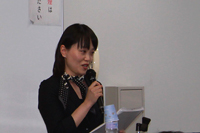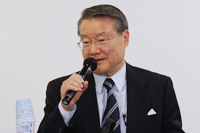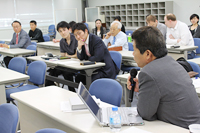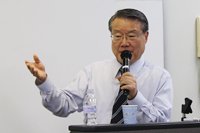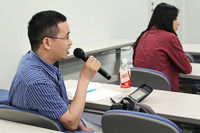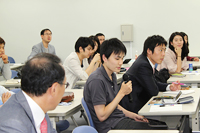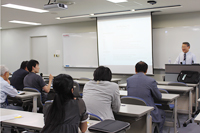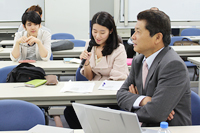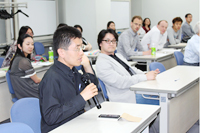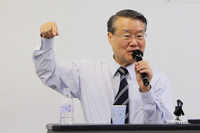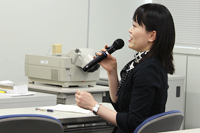Economic Integration and Sustainability
Research:Seminars/Workshops
“East Asian Community and Japan-Korean Relations” Lectured by Professor.Ra Jong-yil
2010.05.28
GIARI “Economic Integration and Sustainability” Seminar
 poster [236KB]
poster [236KB]
- Lecturer: Professor. Ra Jong-yil
- Title: East Asian Community and Japan-Korean Relations
- Date/Time: 28 May (Fri.) 16:00-17:20
- Venue: Room 710, Building 19 ,Waseda University
http://www.waseda.jp/gsaps/info/traffic_en.html - Moderator: Jemma Kim , Assistant Professor, Waseda University
- Language: English (*) Translation: Japanese-Korean, Korean-Japanese in Q&A session
- No-preregistration required
- Organized by: GIARI GIARI : Global Institute for Asian Regional Integration(Waseda University Global COE Program)
 poster [236KB]
poster [236KB] Dr. RA Jong-yil
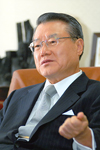
His early career was as a Professor of Political Science at Kyunghee University in South Korea. From 1996 to 1998, he played a key role in the first peaceful change of government through electoral process in Korea and served as the Director of Administration in the Kim Dae-jung Presidential Transition Committee. During President Kim's time in office, Dr Ra served as both the First and Second Director of the Republic of Korea's National Intelligence Service. During the administration of President Roh Moo-hyun, he also served as Senior Advisor to the President on National Security.
Dr Ra has also held a number of very senior diplomatic postings, serving from 2001 to 2003 as ROK Ambassador to the United Kingdom and from 2004 to 2007 as ROK Ambassador to Japan.
Dr Ra has published widely on a range of subjects, including political theory, cultural politics in Northeast Asia, Cold War issues, and on the politics and governance of North Korea. He is currently the President of Woosuk University.
PPT / Q&A
Dr. RA (GIARI, Waseda University, May 28th, 2010)
Q&A session
- Q1. (Prof. Amako)
While thinking about integration in Asia, how to think about China`s issue in China -Korea and China--Japan relation from your view? - A1.
I was really concerned with building up people to people relations and somehow creating an environment where we can work for common purposes like human rights. In the 6 principles as I was enumerating, government relationship is much more difficult. So my topic is promoting or creating a positive relationship among people of different countries. It may sound very difficult but I believe, in the long run perspective it is easier than the government to government or state to state relationship. Government to government relation can change very easily, according to the immediate interest of the leaders at any given time and the top of government. Also it can be a function of domestic power relationship in domestic political context or struggle for power. International relationship can easily reflect this political necessity of people in power at any given period. If leaders are influential enough, they can persuade the people for war at any given time, that, it is incumbent of them to go to war. Or they can manipulate public opinion or public sentiment against other countries. So, it is more difficult if we concentrate on government to government or state to state relationship; it might be very difficult to create a favorable atmosphere to create community of nations. Instead of community of state I would recommend community of people and community of human beings. That's why I was suggesting a common enterprise of cultural projects. Because I believe cultural projects can be a means of narrowing down differences among people and eliminating certain kind of prejudice. It is not totally eliminating rivalry or competition but can limit them. It is very difficult to describe the three country relation in a short sentence. - Q2. (PhD student GSAPS-- from China)
East Asia human Rights Organization is a very good idea and initiative. But the fact is in North-East Asia, different country is in different stages of development and also the human right is in different stage. For example, US use human rights as a weapon to criticize China, so how to prevent these kinds of criticism/events with the Human Rights Organizations?
What`s your vision to Sanction Policy to North Korean in the short run and long run? - A2.
The practical difficulties in implementing the human rights is in different countries under different circumstances. Not only modernization and development but also culture has an impact too. Each country has a different culture which compels us to certain behaviors and actions. For example, in Korea it was used to believe that the male are superior to female members of society and that was part of the Korean culture. But the situation has changed. Therefore, there is no country in this world which is free from criticism in terms of human rights violation; which includes US, European countries, South Korea, North Korea, and China as well. But in principle human rights should be respected and protected. And this principle would allow us to agree and develop in a certain direction which we can call autogenic or positive development in these directions. There have been ups and downs in pursuing a certain policy but I think it basically works at the moment. There is crisis at the moment but there have been crisis in the past too. At the time of Kim… and Rom government, there was a naval conflict, and other conflicts. But even the present government is not opposed to engagement with North Korea in principle. But they wanted to change the rule of game of the engagement with North Korea. If we give something to North Korea or make concession to North Korea, they should respond in kind, to which North Korea doesn`t agree. But I think in the end it will work out because there is no way of fighting it out between the two parts of Korea. I am still optimistic about the issue. - Q3.(MA student GSAPS--Japan)
To avoid the battle field, who will invite them for dinner table? Japan, China, Korea, Or some external powers like ASEAN, or ASEAN +3 or US Or UN? Who will take the initiative? - A3.
I was emphasizing on communal approach rather than bilateral approach of the three countries from the beginning, and limit my premises in these three countries. Initiative should come not from the government but from the people, the civic organizations or students like you! In whatever size, start talking among yourselves. Attitude is the important thing rather than a large gathering; and orientation towards addressing this kind of uncomfortable problems. - Q4.(PhD Student GSAPS-Korea)
Using soft approach or communal approach to the integration of North Korea and using people to people approach is very important according to you. What about in terms of higher education and foreign student mobility between North-East Asian countries? What is your opinion about the integration between North-East Asian students mobility as a soft approach to integration? And what kind of strategies or prospective do Korean universities have in general in the context of integration? - A4.
The word integration is a strong word and I do not believe this vocabulary can be applied to any meaningful project in this region. It's a long sight. I want to call it cohesion instead of integration. In Korea, there are lots of conflicts in Korean society; ideological, regional, generational and among class or strata. The idea of the current president is to integrate but I don`t believe that it is possible or desirable. We shouldn`t integrate a society. In education, partly we are doing that, mainly with China. Korea has bilateral agreement with some of the Chinese universities and mutually we teach language of each other. Our University sends language teachers to Chinese university which are in partnership with us. And we accept Chinese students who wants to come to learn Korean language for 1 or 2 year. If they pass certain level of Korean examination, then they are allowed to come and join us and vice versa. With Japan, it is little bit difficult, because of future goal of getting a job. And Japanese students have less motivation for learning Korean. But we could start and take initiative through government or educators to start something like Erasmus project among three countries. The reason I limit the membership of the community of the three countries is because it is more manageable. If it is more extensive, it becomes unmanageable. If we could do that in this particular part of Asia, it can be expanded to other part of Asia; like EU started with 6 countries and now they are growing so fast. So I think there is a possibility. - Q.5. (Prof. Katsumata-GIARI)
I agree that people to people exchange is more important than government to government exchanges. But why Korean people are not doing that? And people like you who are in government and policy making, why are you not doing that? - A5.
Simply because we are not allowed to access to North Korea. We are allowed to deal with the government alone and it is near impossible to contact people to people with North Korea. I did my share, starting from simple steps like supplying tooth-brush for North Korean children, simple medicine like aspirin and anti-parasite medicines etc. But it's awfully difficult to do this even with the government people. Recently, even people to people contact is not allowed in North Korea to contact people outside of their country, not only between South and North Korea.
Photo
